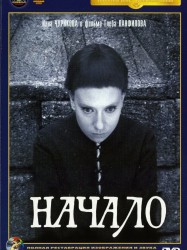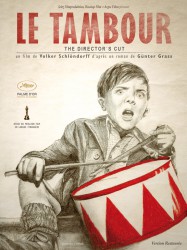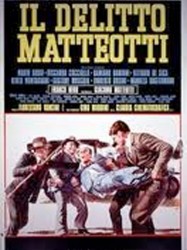La mère est un film russe de genre Drame réalisé par Gleb Panfilov avec Inna Tchourikova
La mère (1990)
Mat

Si vous aimez ce film, faites-le savoir !
- Infos
- Casting
- Infos techniques
- Photos
- Vidéos
- Passages TV
- Citations
- Personnages
- Musique
- Récompenses
La Mère (titre original : Mat) est un film italo-soviétique réalisé par Gleb Panfilov, sorti en 1990. Le film est récompensé par le prix de la meilleure contribution artistique au Festival de Cannes 1990.
Acteurs
Commentaires
Postez un commentaire :
Suggestions de films similaires à La mère
Il y a 111 films ayant les mêmes acteurs, 7 films avec le même réalisateur, 62769 ayant les mêmes genres cinématographiques (dont 4055 ayant exactement les mêmes 2 genres que La mère), pour avoir au final 70 suggestions de films similaires.Si vous avez aimé La mère, vous aimerez sûrement les films similaires suivants :
 , 7h20
, 7h20Réalisé par Gleb Panfilov
Acteurs Evgueni Mironov, Inna Tchourikova, Dmitry Pevtsov, Albert Filozov, Igor Sklyar, Igor Kvacha
Note71%





Based on Aleksandr Solzhenitsyn’s autobiographical novel and set during the fearful times of Stalin’s mass arrests, the series takes place in a sharashka, a prison-laboratory for secret research where Russia’s greatest minds are put to government use. While living conditions in this «first circle of hell» are incomparably superior to the Gulag camps, the scientists there face the moral dilemma of cooperating with an inhuman system. The action begins when a Ministry of Foreign Affairs official makes an anonymous phone call to the American embassy, trying to warn them about a leak of information that would allow the USSR to build the atomic bomb. In order to identify the traitor, the KGB turns to one of the projects at the sharashka. The character of Gleb Nerzhin (Yevgeny Mironov), a mathematician who chooses the horrors of the Gulag rather than compromise his conscience, is based on Solzhenitsyn himself. The First Circle is a hard but optimistic story about the victory of the human spirit over totalitarianism.

Le Début (1970)
, 1h31Réalisé par Gleb Panfilov
Origine Russie
Genres Drame, Comédie, Romance
Thèmes Jeanne d'Arc, Histoire de France
Acteurs Inna Tchourikova, Leonid Kouravliov, Mikhaïl Kononov, Yuri Klepikov, Yuri Vizbor, Evgueni Lebedev
Note75%





Une jeune et ordinaire provinciale reçoit une proposition inattendue de jouer au cinéma le rôle de Jeanne d'Arc.

Le Thème (1979)
, 1h39Réalisé par Gleb Panfilov
Genres Drame, Comédie dramatique, Romance
Thèmes Film sur un écrivain
Acteurs Inna Tchourikova, Evgueni Iakovlevitch Vesnik, Stanislav Lyubshin, Natalya Seleznyova
Note72%





Un auteur de théâtre connu traverse une grave crise existentielle. Il va tenter de se ressourcer dans un village russe traditionnel (Souzdal)

Je demande la parole (1976)
Réalisé par Gleb Panfilov
Genres Drame
Acteurs Inna Tchourikova, Nikolaï Goubenko, Vasily Shukshin
Note69%





Fiche technique Titre : Je demande la parole

Vassa (1983)
, 2h20Réalisé par Gleb Panfilov
Origine Russie
Genres Drame
Thèmes Adaptation d'une pièce de théâtre
Acteurs Inna Tchourikova, Albert Filozov
Note73%






Pas de gué dans le feu (1968)
, 1h35Réalisé par Gleb Panfilov
Genres Drame, Guerre
Acteurs Inna Tchourikova, Mikhaïl Kononov, Anatoli Solonitsyne, Mikhaïl Glouzski, Maya Bulgakovа, Maïa Boulgakova
Note73%





Une jeune infirmière et peintre amatrice est confrontée aux horreurs de la guerre civile.
 , 2h15
, 2h15Réalisé par Gleb Panfilov
Origine Russie
Genres Drame, Biographie, Historique, Romance
Thèmes Politique, Royauté
Acteurs Lynda Bellingham, Yuliya Novikova, Kseniya Kachalina, Olga Boudina, Andreï Kharitonov, Olga Vasilyeva
Note71%





The film begins on the night of February 22, 1917, before the Tsar departs to the war front of Stavka. Russia under Tsar Nicholas II was in the third year of World War I. By 1917, Russia had suffered many losses. Nevertheless, the tsar's authority with the people was high. Petrograd (formerly St. Petersburg) was an exception. Late at night, Nicholas and Alexandra are woken up by their son, Alexei who has a high fever, as well as Olga, the eldest of the five children. The next morning, Nicholas leaves to Stavka, at the war front. Meanwhile in Petrograd, people are starting to revolt. A street is bombed and many are killed. The Russian Revolution has started. Nicholas arrives at Stavka and he is told that his son Alexei, a hemophiliac, will not live to the age of 16. Back in Petrograd, Alexandra is told about the chaos in the city. At the Imperial Train, Nicholas is given documents requesting his abdication. He signs and is no longer Emperor of All the Russias. He had decided to give the throne to his son Alexei, but due to his bad health, he decides to give the throne to his brother Michael, who does not accept it. Russia is left without an emperor.

Мертвые души (1984)
, 6h27Réalisé par Mikhail Schweitzer
Genres Drame, Comédie, Historique
Acteurs Tamara Nossova, Innokenti Smoktounovski, Iouri Bogatyriov, Vyacheslav Nevinny, Inna Tchourikova
Note74%






Le Tambour (1979)
, 2h15Réalisé par Volker Schlöndorff
Origine Allemagne
Genres Drame, Guerre, Historique
Thèmes L'armée française, L'enfance, La musique, Religion, Politique, Religion juive
Acteurs David Bennent, Mario Adorf, Angela Winkler, Daniel Olbrychski, Katharina Thalbach, Charles Aznavour
Note73%





L'histoire du Tambour est racontée sous la forme d'un long monologue, dont le narrateur n'est autre que le héros lui-même, Oskar Matzerath, un bien étrange personnage. Doté d'une intelligence hors du commun, il reçoit en cadeau, pour son troisième anniversaire le 12 septembre 1927, un tambour de fer-blanc laqué rouge et blanc. Choqué par le monde des adultes, il décide de cesser de grandir. Pour cela, il fera exprès de chuter du haut des escaliers de la cave de sa maison, et va ainsi conserver sur le monde un regard d'enfant implacable et inflexible.

Il delitto Matteotti (1973)
, 1h55Réalisé par Florestano Vancini
Origine Italie
Genres Drame, Historique
Thèmes Politique, Politique
Acteurs Mario Adorf, Franco Nero, Umberto Orsini, Vittorio De Sica, Renzo Montagnani, Gastone Moschin
Note69%





Le député socialiste (Parti socialiste unitaire) Giacomo Matteotti condamne vivement le déroulement des élections législatives d'avril 1924 en Italie, qui permet aux fascistes, conduits par Benito Mussolini, d'occuper les deux tiers des sièges parlementaires. Matteotti milite, avec détermination, en faveur de l'annulation de ce scrutin qu'il estime truqué et préconise la tenue de nouvelles élections. Mais, en juin de la même année, il est enlevé et assassiné par des squadristi fascistes... Le "Duce" Mussolini a sans doute couvert l'opération, même si sa participation (directe ou indirecte) n'a jamais été formellement établie...
 Connexion
Connexion



